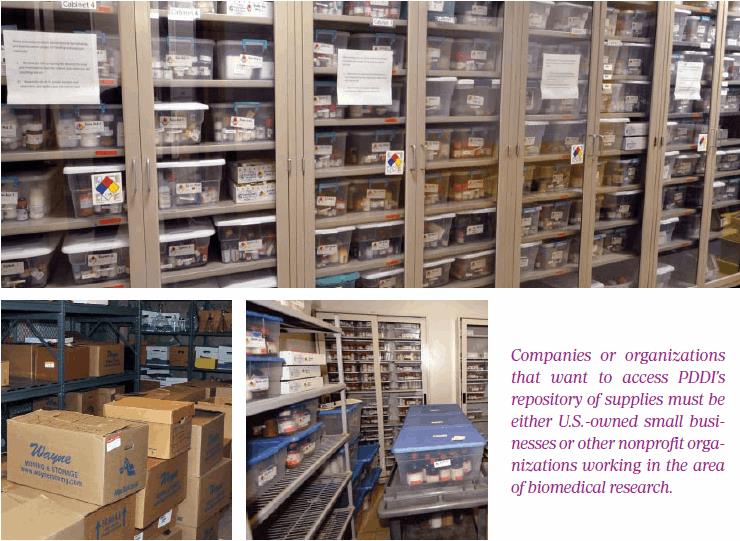A Positive Outcome From Pharma Closures
By Dan Schell, Chief Editor, Clinical Leader
The large changes impacting biopharma in the Delaware Valley (i.e., Philadelphia metropolitan area) have presented a rather unique opportunity for capturing surplus biomedical research assets. As many of us know all too well, facility closures and downsizing initiatives usually result in the disposal of significant quantities of expensive chemicals, starting materials, equipment, consumables, and general and specialized industrial-grade glassware. That usually meant the safe disposal of the chemicals and the remainder of the materials being sent to landfill after appropriate washing and crushing.
But the Pennsylvania Drug Discovery Institute (PDDI) had another idea. Instead of disposing of these valuable resources, the PDDI offered to serve as a repository for these materials, archive and curate them, and then make them available for no charge to academic institutions and small biotech companies as a public service.
Presenting this proposition to a number of biopharma firms in the Delaware Valley resulted in PDDI receiving more than 22,000 reagents and starting materials, among many other consumables and related assets. “Our organization has its own liability insurance and assumes complete ownership of these donations on an as-is basis,” explains PDDI President, Chairman of the Board, and Cofounder Allen Reitz, Ph.D. The reagent donations are incorporated into one consolidated collection, bar-coded, and clustered in functionality appropriate bins. Much of this work is conducted with the aid of medicinal chemists from the Fox Chase Chemical Diversity Center co-located with the PDDI at the Pennsylvania Biotechnology Center in Doylestown, PA. This curated repository has an estimated worth of >$2.5 million. But more important than its monetary value, it represents a valuable resource for the local biopharma and educational community.
AN INVALUABLE RESOURCE TO BIOTECH STARTUPS, SCHOOLS
Companies or organizations that want to access PDDI’s repository of supplies must be either U.S.-owned small businesses or other nonprofit organizations working in the area of biomedical research. They cannot resell any of the chemicals or other assets received from PDDI.
The reagent collection has been made available to local high school chemistry instructors and professors at universities such as Villanova University and Immaculata University. Many of the small startup firms at the Pennsylvania Biotechnology Center where the PDDI is co-located also take advantage of the chemical repository. Doing so permits them to pursue chemical ideas they might not be able to address otherwise considering many of the starting materials in the collection are very expensive. “Were it not for the cooperation of many of the firms that have donated to our collection, these valuable reagents would be in a landfill or incinerated,” says PDDI CEO and Secretary/Treasurer Dennis Gross, M.S., Ph.D.
As important as the chemical reagent collection is, it’s the consumables that have turned out to be the most attractive part of the program, especially to the local educational community. These include test tubes, vials, pipette tips, and an extensive repository of glassware for both chemistry and pharmacology. “All one has to do is look at a glassware catalog to note that a 100 mL volumetric flask costs $26, to see the need for this repository of surplus assets,” comments Reitz. Many of these materials have been repurposed to a number of local high schools in Pennsylvania and New Jersey. In one instance, the PDDI provided glassware for a new biology instructor at a health sciences-themed high school in a nearby county. The school’s mission is to provide focused programs in the health sciences for students interested in becoming nurses, dental assistants, and pharmacy technicians among others. Hands-on classroom and experiential opportunities help students to graduate with an employable skillset should they decide not to go to college. Gross adds, “It’s very gratifying to see a high school biology or chemistry instructor accept a number of boxes of beakers, graduated cylinders, and Erlenmeyer flasks that will all be used to help support their teaching mission.”
A similarly rewarding event took place recently when a PDDI alliance school, a small local university, was given enough glassware that enabled the faculty to create a second section of organic chemistry lab. All these activities did not just happen overnight, but represent the expansion of the vision of the founders of the PDDI, its senior management, members of its board of directors, and the cooperation of the many local firms that have embraced the PDDI vision of helping the local life sciences community.
The Pennsylvania Drug Discovery Institute (PDDI) was founded in Doylestown, PA, in June 2010 by Allen Reitz and Kathy Czupich and has obtained 501(c)(3) nonprofit designation from the IRS. PDDI’s mission is to provide services to the local scientific community such as workforce reentry assistance for recently separated senior researchers via networking activities. It also provides courtesy faculty positions to enable displaced senior scientists to fill gaps in their professional resume as they pursue new career options.

